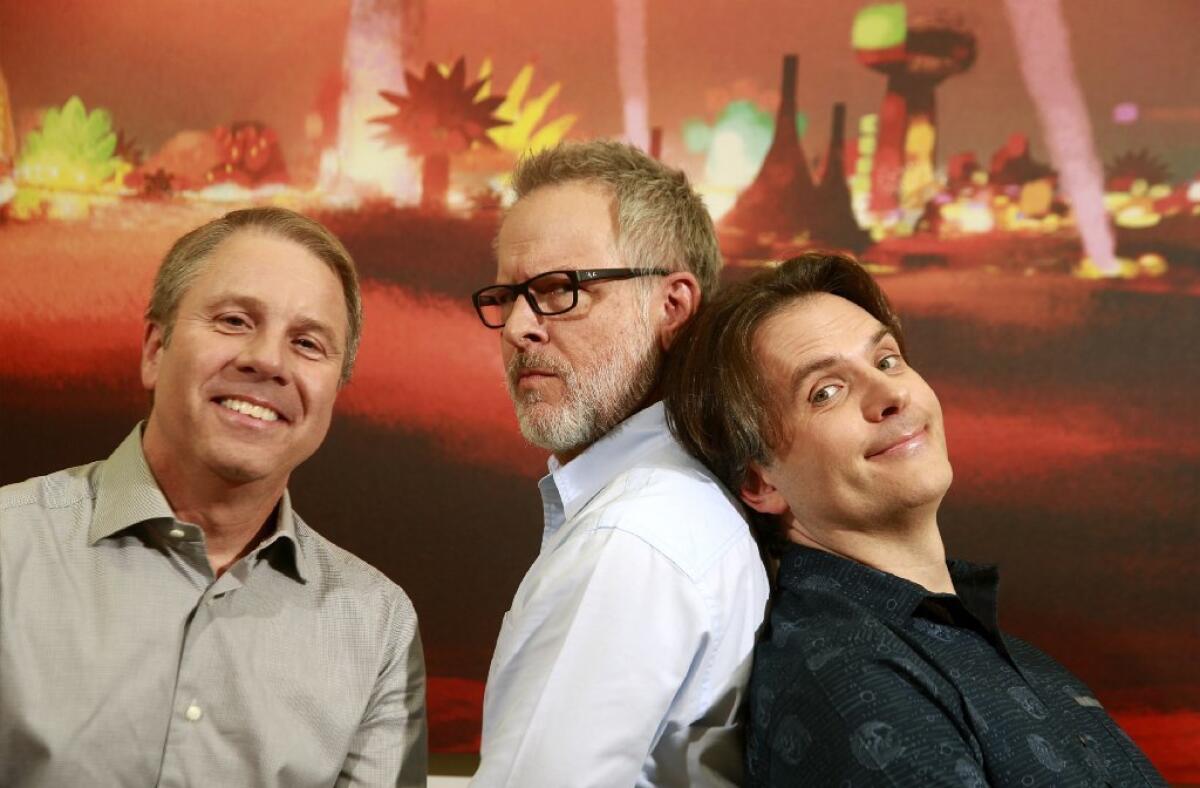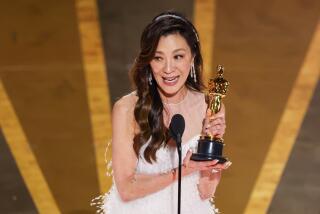In making ‘Zootopia,’ the message began to feel all too real

- Share via
About five years ago, Disney started developing an animated funny-animal movie about prejudice. The filmmakers couldn’t have known “Zootopia” would become one of the biggest grossers of all time, or that its themes would become even more relevant by its release.
“Yay, the world is going to hell!” exclaims Rich Moore, laughing at his own gallows humor. Moore directed along with Byron Howard and the two got together with producer Clark Spencer in a Walt Disney Animation Studios conference room in Burbank to chat about the film that has a worldwide box office upwards of $1 billion.
“We weren’t patting ourselves on the back, but as we saw the real world was leaking into ours, or the ‘Zootopia’ world into the real world, we felt like we really needed to double down.
We didn’t want a character in Judy who, by the end of the movie, had cured discrimination and bias.”
— Rich Moore
“To the credit of our story team, they said, ‘This cannot be a “message” movie. We can’t be up on our soap box saying, “Racism is bad!” ’ We didn’t want a character in Judy who, by the end of the movie, had cured discrimination and bias.”
They seem to have found a balance between message and entertainment.
Howard says of the pack mentality and pecking parties the comedy explores, “From the very beginning, we had this idea of predator and prey. We thought this was an amazing parallel for human beings … You see it in our own world, you see it in politics. So the [idea of the] film got very interesting very quickly.”
Spencer, who has known Howard for 20 years since their work on “Lilo & Stitch,” credits those diverse influences with making “Zootopia” what it became.
“I think the DNA of the film pushes different boundaries,” says Spencer. “There are moments when people say, ‘That feels like a Disney kind of a shot,’ and then there are other aspects, particularly on the comedy side of it, that Rich and Phil Johnston, one of the screenwriters, brought in. There’s a great line where the dad says, ‘It’s great to have dreams … as long you don’t believe in them too much.’ ”
Moore chortles: “Classic Disney line!”
One of the film’s organizing ideas is that its city is built by animals, for animals. That affords countless animal-themed gags (businesses named “Targoat,” “DNKY,” etc.), but also creates unique logistical issues.
“Mickey Mouse is way too big for a mouse; that would be terrifying,” says Howard, as everyone laughs. “From the beginning, we decided to hold ourselves to a tough rule: Whatever the size of an animal is in our world, that’s what we’re going to stick to. So a mouse in ‘Zootopia’ is the size of a mouse in our world. A giraffe is 95 mice high. Rich is 25 mice high.”

“For Mr. Big, we needed to have a big mob boss, but it would be great if it were a small guy,” Howard adds. “So who’s the most terrible predator in the small world? The shrew is the most vicious carnivore. We were told by our animal experts, if you put four shrews in a bucket and cover it up overnight, you’ll come back the next morning and have one fat shrew left. They’re horrible.”
The primary villain, the sheep Bellwether, “is sort of a dark version of [heroic bunny] Judy. Both characters have been marginalized and disenfranchised by this world. Judy has sort of taken the light path — ”
Moore chimes in, “She goes high!”
“Bellwether’s like, ‘Screw it, I’m goin’ low!’ ” Howard finishes.
Moore says story artist Lauren MacMullan told them, “‘There is a term for the smartest sheep in a group. It’s called a “bellwether.” The shepherd puts a bell on his collar; the other sheep will follow that one.’”
So the movie’s medicine came with enough spoonfuls of sugar to go down for the masses. But did it reach individuals? Moore and Howard happily cite Yusuf Islam’s (the former Cat Stevens) recitation of Judy’s climactic pro-tolerance speech at concerts to introduce his iconic hit, “Peace Train.”
Spencer recalls a screening for kids at the academy theater: “Afterward, we do this forum. This one girl, probably like 14 or 15, she raised her hand and said, ‘Yesterday was the worst day of my life. I wasn’t sure what the future was going to be. This movie has so impacted me and made me feel there is hope.’ … You realize — movies can be, at the right moment in time, something they need.”
See the most read stories this hour »
ALSO:
Animated films big (‘Finding Dory’) and small (‘The Red Turtle’) draw on all aspects of life
How ‘Zootopia’s’ upbeat score explores race and prejudice
Oscar predictions for animated feature, song and score -- with a nod to a possible EGOT addition
‘Zootopia’ and ‘Kubo’ lead Annie Awards nominations
Lin-Manuel Miranda navigates the Pacific to help send ‘Moana’ on a daring adventure
More to Read
From the Oscars to the Emmys.
Get the Envelope newsletter for exclusive awards season coverage, behind-the-scenes stories from the Envelope podcast and columnist Glenn Whipp’s must-read analysis.
You may occasionally receive promotional content from the Los Angeles Times.




